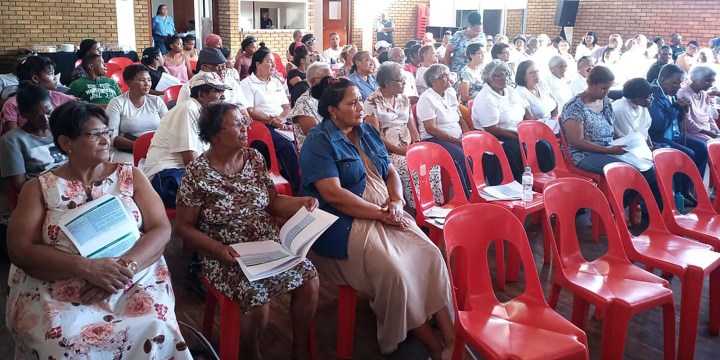LETTER TO THE EDITOR
WC Standing Committee prioritises transparency and accountability in public participation on bills

Public participation, transparency and accessibility have guided the Western Cape government in its public hearings on the Copyright and Performers' Protection Amendment Bills.
I write in my capacity as chairperson of the Finance, Economic Opportunities and Tourism Standing Committee in the Western Cape Provincial Parliament (WCPP). The Daily Maverick Opinionista article by Pam Saxby, “Time for provincial legislatures to wake up and ensure live-streaming of public hearings on controversial bills” of 16 February 2023 refers.
Public participation is a vital component of our legislative process and getting it right requires transparency and accessibility. These values have guided the Western Cape’s Standing Committee for Finance, Economic Opportunities and Tourism when conducting public participation and encouraging submissions for the Copyright and Performers’ Protection Amendment Bills.
While of course, there is always room for improvement, and each public participation process brings with it new lessons that can be applied going forward – this standing committee has gone above and beyond to ensure meaningful public participation.
We understand that these bills will impact entertainers and performers of all levels in the country, and as such it’s of immense importance that the public has a chance to make their voices heard. That is why I disagree with the underlying inference in the article that not enough is being done by this standing committee to ensure that the process is accessible.
To start with, we have arranged public hearings in each district municipality in the Western Cape – including both rural and urban communities. To date, we have completed three public hearings, in Oudtshoorn, Stellenbosch and Darling. Next up, we will be visiting Hermanus and then conclude our hearings in Cape Town where we expect to receive over 15 submissions from experts.
Our public hearings to date have been extremely well attended with between 75 and 100 attendees. We also received numerous substantial written submissions, with some joint submissions from industry and academia.
This was made possible by working closely with the Provincial Parliament’s Public Education and Outreach (PEO) unit to invite their stakeholders and their network of community development workers (CDWs) to spread the word about the bills and the public participation process. The CDW network and PEO’s contacts played a major role in encouraging attendance at the hearings.
The Department of Economic Development and Tourism and the Department of Cultural Affairs and Sport were requested to send the information about the bills and the invitation to make oral and written submissions to their stakeholders. Invitations were also extended to all speakers, mayors, and municipal managers in all municipalities in the Western Cape, as well as business chambers and trade unions.
Visit Daily Maverick’s home page for more news, analysis and investigations
To make sure stakeholders could attend meetings, transport was provided by the committee to interested stakeholders who wanted to join the public hearings but did not have the means to attend in person. For each hearing, we have also promoted transparency and accessibility by having translation services present.
When these bills came before the committee, it was requested that the provincial parliament’s media and communication unit prepare a comprehensive media plan, which included an initial press release on the public hearings. Media alerts, along with voice recordings, have also been sent to media and stakeholders ahead of each hearing. Added to this, the hearings have been advertised in mainstream local newspapers including Die Burger, Cape Argus, Die Son, and other community papers.
Contrary to the article, the local media did attend the Oudtshoorn and Stellenbosch meetings, and I conducted radio interviews with local stations for both Oudtshoorn and Darling.
The committee has also, in a first for the provincial legislature, made use of online Facebook advertising to target stakeholders, including artists, musicians, performers, academic institutions, entertainment agencies, lawyers, authors, and illustrators, to name a few. A series of infographics was also commissioned informing the public of each hearing. The graphics were also scheduled on Twitter and Facebook on the WCPP’s media pages.
An online submission form was also created, which was linked to the WCPP website, where members of the public could submit their comments online and indicate whether they wanted to make oral submissions to the committee. This link was used for the paid Facebook advertising as well as all media statements and WCPP Facebook and Twitter posts.
Of course, when conducting public meetings in rural towns, connectivity can be challenging. To make sure the word about the hearings reached as far as necessary, the Parliamentary Monitoring Group (PMG) added the request for comments to their “Call for Comments” section, which reaches around 8,000 subscribers.
The PMG also indicated that they are happy to publish the audio and any documents we have and will publish a report on the Cape Town hearing. This was specifically requested following constructive feedback received from the author of the article.
To improve accessibility and make it as easy as possible for residents to make submissions, interested persons may request information, make oral submissions, and send written submissions by email, the online submission form, and WhatsApp. The Western Cape Provincial Parliament has also created a dedicated tab on the bill on its website.
These bills have far-reaching implications and we must ensure that we are taking every step possible to promote transparency and accessibility in these public participation processes. DM




















Comments - Please login in order to comment.